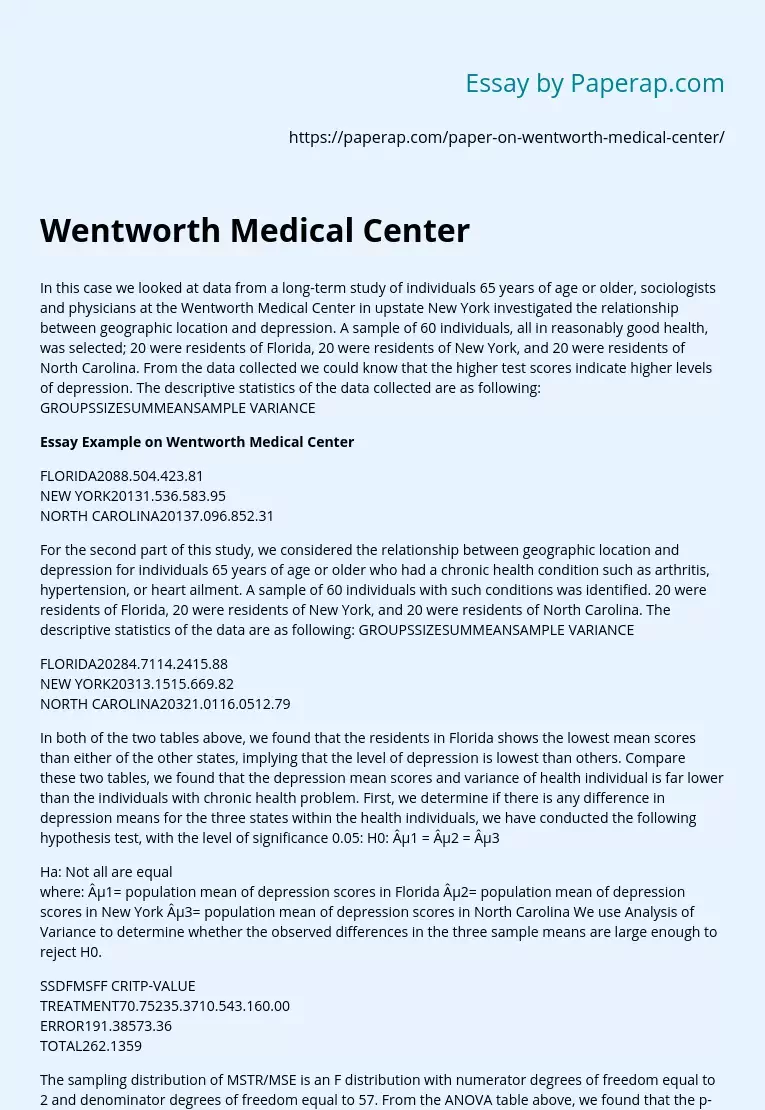Wentworth Medical Center
In this case we looked at data from a long-term study of individuals 65 years of age or older, sociologists and physicians at the Wentworth Medical Center in upstate New York investigated the relationship between geographic location and depression. A sample of 60 individuals, all in reasonably good health, was selected; 20 were residents of Florida, 20 were residents of New York, and 20 were residents of North Carolina.
From the data collected we could know that the higher test scores indicate higher levels of depression.
The descriptive statistics of the data collected are as following: GROUPSSIZESUMMEANSAMPLE VARIANCE
Essay Example on Wentworth Medical Center
FLORIDA2088.504.423.81
NEW YORK20131.536.583.95
NORTH CAROLINA20137.096.852.31
For the second part of this study, we considered the relationship between geographic location and depression for individuals 65 years of age or older who had a chronic health condition such as arthritis, hypertension, or heart ailment. A sample of 60 individuals with such conditions was identified. 20 were residents of Florida, 20 were residents of New York, and 20 were residents of North Carolina. The descriptive statistics of the data are as following: GROUPSSIZESUMMEANSAMPLE VARIANCE
FLORIDA20284.7114.2415.88
NEW YORK20313.1515.669.82
NORTH CAROLINA20321.0116.0512.79
In both of the two tables above, we found that the residents in Florida shows the lowest mean scores than either of the other states, implying that the level of depression is lowest than others. Compare these two tables, we found that the depression mean scores and variance of health individual is far lower than the individuals with chronic health problem. First, we determine if there is any difference in depression means for the three states within the health individuals, we have conducted the following hypothesis test, with the level of significance 0.
05: H0: µ1 = µ2 = µ3
Ha: Not all are equal
where: µ1= population mean of depression scores in Florida µ2= population mean of depression scores in New York µ3= population mean of depression scores in North Carolina We use Analysis of Variance to determine whether the observed differences in the three sample means are large enough to reject H0.
SSDFMSFF CRITP-VALUE
TREATMENT70.75235.3710.543.160.00
ERROR191.38573.36
TOTAL262.1359
The sampling distribution of MSTR/MSE is an F distribution with numerator degrees of freedom equal to 2 and denominator degrees of freedom equal to 57. From the ANOVA table above, we found that the p-value for this test is equals to 0 which is less than the level of significance of α=0.05. As a result, we reject H0 and conclude that the means of the three depression levels between difference states are not equal. For further test, we need to determine where the differences occur. We use Fisher’s LSD procedure to make three pairwise comparisons: Test 1 Test 2 Test 3
H0: µ1 = µ2H0: µ1 = µ3H0: µ2 = µ3
Ha: µ1 ≠ µ2Ha: µ1 ≠ µ3Ha: µ2 ≠ µ3
where: µ1=population mean of depression scores in Florida
µ2= population mean of depression scores in New York
µ3= population mean of depression scores in North Carolina We use the level of significance of α=0.05. The value of LSD in this case is equals to 1.16. We only reject null hypothesis when test statistic |x̄i – x̄j|> LSD. The calculated results are as following:
Test StatisticLSD
Test 12.151.16
Test 22.431.16
Test 30.281.16
The difference between the mean for population 1 and population 2 are greater
than LSD, which means we can reject null hypothesis and conclude that the mean for population 1 is not equals to population 2. Similarly, with the difference between the sample means for population 1 and 3 is 2.43>1.16, we can also reject null hypothesis. But in test 3, the difference between the sample means for population 2 and 3 is 0.280.05). As a result, we could not reject null hypothesis, and conclude that there is no difference between the mean of depression levels of the individuals who had a
Wentworth Medical Center. (2019, Nov 27). Retrieved from https://paperap.com/paper-on-wentworth-medical-center/

